how to become a firearms instructor
Become an NRA or SAFTEA Firearms Instructor
NRA Instructor Program
Thank you for your interest in the NRA Instructor Training Program. The goal of this program is to develop instructors to teach NRA Basic Firearm Training Courses according to the lesson plans and training standards of the National Rifle Association. This program is not designed to prepare you to teach other firearm training courses (such as law enforcement, security, or hunter safety courses), nor to prepare you to develop firearm training courses of your own.
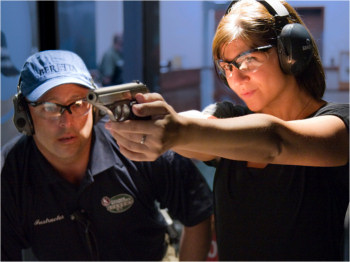 The NRA Instructor Training Course is designed to teach you how to teach others to shoot using NRA lesson plans and training methods. The course is not designed to improve your shooting skills. Possession of basic firearm safety and/or shooting skills is a prerequisite for certification as an NRA instructor. You may be asked to demonstrate your firearm background through participation in pre-course assessment exercises. We highly suggest enrolling in the student level course before instructor training even when it is not a prerequisite.
The NRA Instructor Training Course is designed to teach you how to teach others to shoot using NRA lesson plans and training methods. The course is not designed to improve your shooting skills. Possession of basic firearm safety and/or shooting skills is a prerequisite for certification as an NRA instructor. You may be asked to demonstrate your firearm background through participation in pre-course assessment exercises. We highly suggest enrolling in the student level course before instructor training even when it is not a prerequisite.
A complete NRA Instructor Training Course consists of two parts. The first is basic instructor training, which consists of 6 hours of instruction. The second part is discipline-specific instructor training, which consists of an additional 5 to 14 hours of instruction per discipline. For example, an NRA Instructor Training Course in rifle, pistol, and shotgun lasts at least 40 hours.
During the NRA Instructor Training Course, you will receive from your Training Counselor the NRA Trainer's Guide, the appropriate NRA Instructor Candidate Packet which includes the course outlines and lesson plans for the disciplines you wish to teach, the appropriate NRA basic course student packet which includes the handbook, certificates, NRA Gun Safety Rules brochure and other materials used in NRA basic courses.
The NRA Training Counselor who conducts your course will make a recommendation to NRA concerning your certification based on an evaluation of your knowledge, skills, and attitude. You will be asked to demonstrate your organizational and teaching skills through participation in several practical exercises during the course of your training. You will also be asked to complete an instructor certification examination. A minimum score of 90 percent is required for certified instructor applicants (85 percent for assistant and apprentice instructor applicants). However, attendance at the course, or a passing grade on the examination, does not guarantee that you will receive the recommendation of the NRA Training Counselor.
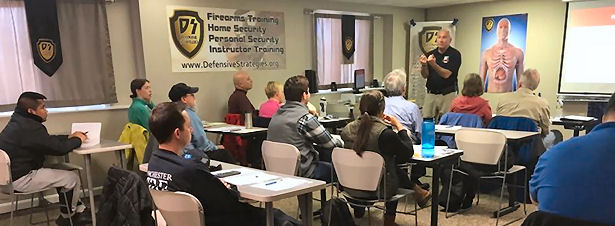 Instructor certification is valid for one year upon initial certification. After completion of the first year, instructors may renew their instructor credentials for up to three years at a time. NRA encourages instructors to remain active and would like to see at least one basic course taught per year.
Instructor certification is valid for one year upon initial certification. After completion of the first year, instructors may renew their instructor credentials for up to three years at a time. NRA encourages instructors to remain active and would like to see at least one basic course taught per year.
Please remember NRA Instructor Courses are performance based courses, Instructor Candidates must possess the knowledge, skills and attitude necessary for this level of training. You do not pay and automatically pass Instructor training. You pay to have the opportunity to pass.
Instructor Classifications:
Certified instructor: 21 years of age or older
Assistant instructor: 18 years of age or older
Apprentice instructor: 13-17 years of age
NRA Assistant Instructors are individuals 18 years of age or older who assist certified instructors to gain the knowledge and experience needed to become certified instructors. Assistant instructors must complete the same instructor level course. The Assistant Instructor ratings are available in six disciplines (Pistol, Rifle, Shotgun, and Muzzleloading Pistol, Muzzleloading Rifle, and Muzzleloading Shotgun). There are no Assistant Instructor ratings for Home Firearm Safety, or the Personal Protection and Reloading disciplines.
NRA Apprentice Instructors are young people 13 to 17 years old who wish to understudy a certified instructor. An NRA Certified Instructor will choose the apprentice instructor from select individuals. These individuals must possess the emotional maturity necessary to handle such a position. In addition, they must attend and successfully complete the appropriate NRA Basic Firearm Training Course prior to attending an NRA Instructor Training Course. Apprentice instructor ratings are available in the three disciplines of rifle, pistol, and shotgun. There are no Apprentice Instructor ratings for Home Firearm Safety, Personal Protection, Muzzleloading, or Reloading disciplines.
NRA Basic Instructor Training (BIT)
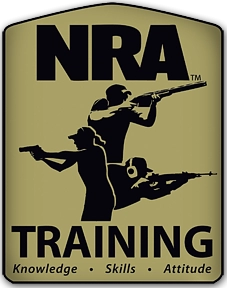 NRA Basic Instructor Training is designed to develop NRA Certified Instructors who possess the knowledge, skills, and attitude necessary to conduct the NRA Basic Firearm Training Courses. It is the NRA class that helps people who already have subject matter expertise learn how to hold a class the NRA way so that their students earn recognized NRA certification.
NRA Basic Instructor Training is designed to develop NRA Certified Instructors who possess the knowledge, skills, and attitude necessary to conduct the NRA Basic Firearm Training Courses. It is the NRA class that helps people who already have subject matter expertise learn how to hold a class the NRA way so that their students earn recognized NRA certification.
This course teaches you the policies and procedures for becoming an NRA instructor as well as effective teaching methods for training students. Basic Instructor Training is a pre-requisite for all instructor level courses.
NRA Basic Instructor Training opens with an exercise on "How to Introduce a Speaker" designed as an icebreaker. You're paired with another Instructor Candidate, spend a few minutes in exchanging information, and introduce each other to the class. Immediately you start learning how to talk on your feet while we teach you how to offer useful praise and constructive suggestions. We help you conquer shyness and develop a communications bridge with a group of people who depend on you for positive instruction. Our classes establish an atmosphere in which your fellow students assist us in helping you succeed.
All courses include the required NRA documentation, instructor guides, student packets, instruction and follow up support. You will receive everything needed to first take and then teach each course. Note: There will be processing fees payable to the NRA due upon the completion of class. Fee's are determined by how many and which courses you attend.
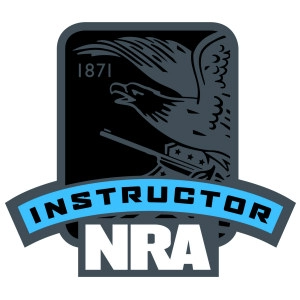 This course is a minimum of 6 hours and covers the following topics:
This course is a minimum of 6 hours and covers the following topics:
- How to introduce a speaker
- The instructor and the NRA Basic Firearm Training Program
- Using a training team
- Training materials and training aids
- Organizing your course
- Preparing to teach
This course is the mandatory pre-requisite for initial NRA Certified Instructor training.
To be certified as an NRA Instructor, students must complete this 6-hour course that teaches material common to all NRA courses. This course does not certify the instructor candidate to teach any NRA courses. Additional discipline-specific instructor training is required to certify instructor candidates to teach specific courses.
After you successfully complete NRA Basic Instructor Training and score at least 90% on the Trainers Examination you should be ready for whichever discipline-specific instructor training class comes next for you: Pistol, Rifle, Shotgun, or Personal Protection depending on your qualifications and enrollment. You demonstrate your qualifications through the Pre-Course Qualification tests associated with the specific discipline.
The first day of most NRA instructor training courses consists of this 6 hour Basic Instructor Training (BIT).
Special Note for Current Instructors adding a rating: When adding ratings, instructors may be required to attend another Basic Instructor Training (BIT) Course if they have not completed that course within the previous 2 years.
Second Amendment Firearms Training & Education Association
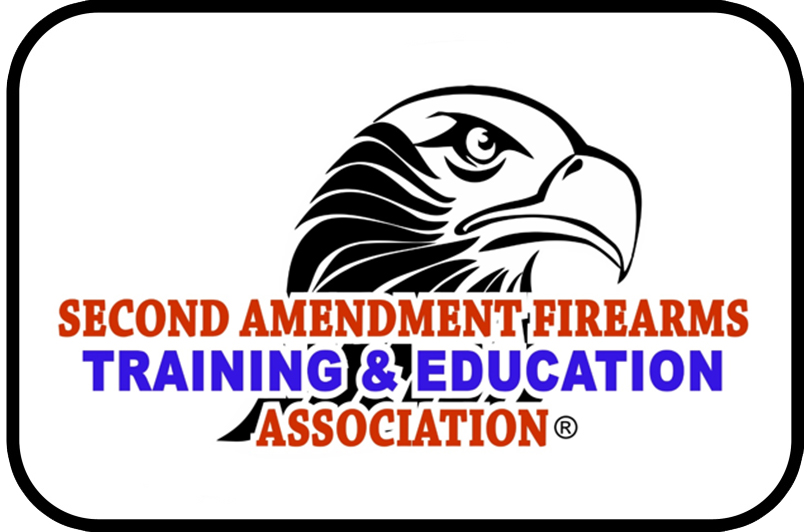 The Second Amendment Firearms Training & Education Association Instructor level courses are designed to teach the experienced shooter/instructor, how to present the SAFTEA courses to the general public using the SAFTEA Methods of Instruction (MOI) as a basis for instructional methods and techniques. These courses also encompasses the proper running of the range portions and the best practices for achieving the maximum amount of learning from the students.
The Second Amendment Firearms Training & Education Association Instructor level courses are designed to teach the experienced shooter/instructor, how to present the SAFTEA courses to the general public using the SAFTEA Methods of Instruction (MOI) as a basis for instructional methods and techniques. These courses also encompasses the proper running of the range portions and the best practices for achieving the maximum amount of learning from the students.
The Second Amendment Firearms Training & Education Association Instructor level courses are designed to teach the instructor candidates how to teach the student level course and are not designed to increase skills of the instructor candidates, all instructor candidates must already posses the skills necessary in the discipline they are taking. All instructors candidates are must also meet the following requirements:
- Must posses outstanding firearm handling safety skills and pass shooting qualifications
- SAFTEA Methods of Instruction MOI / (2 Days)
- Liability Insurance with minimum of 1,000,000 coverage is Highly Recommended
- 3 sealed letters of recommendation.
- 2 page bio on relevant experience and why you would be a good SAFTEA Instructor.
- Copy of all previous training, certifications, and licenses.
- SAFTEA Range Officer Certification
- First Aid, CPR and AED Certification (National or State recognized organization)-(Must be up to date.)
- Must take and pass the SAFTEA Student level class.
- Must be at least 21 years old
- Must be a U.S. Citizens or Legal Permanent Resident with valid immigration card. (ITAR)
- Must speak, write and understand English
- Must be able to legally posses firearms under both Federal and State laws.
Instructors
Local Instructor candidates, must attend SAFTEA Methods of Instruction (MOI) and SAFTEA Range Officer (RO). To attend an instructor class the instructor candidate must have also attended the student portion of the class they wish to become an instructor in. The instructor candidate must demonstrate proficiency and knowledge before attending an instructor class through a qualification & safety evaluation. Instructor candidates must obtained a 90%+ on the student test and the instructor test. The mission of the SAFTEA Instructors is to instruct students using the SAFTEA approved syllabus, methods and maintain the standard set forth by SAFTEA.
SAFTEA Credit Transfer Program (NEW)
Transfer credit, credit transfer, or advanced standing are the terms used by colleges and universities for the procedure of granting credit to a student for educational experiences or courses undertaken at another institution. "Advanced standing" is also used to describe the status of a student granted credit, as distinct from normal course entrants who commence the stream of study at the beginning. When a student transfers, he or she usually provides his or her academic transcript(s) which lists the course taken, grade and other attributes from each institution they attended when applying for enrollment. Each transcript and the listed courses are tentatively evaluated to see if any of the courses taken satisfy the requirements of the receiving institution.
Currently certified and insured firearms instructors with at least 2 years of verifiable defensive firearms teaching experience may apply for transfer of credit, and upon approval will be eligible for the 3 day version of the SAFTEA firearms instructor certification course. Acceptable certifications include, but are not limited to the following certifications:
1. Rangemaster Certified Firearms Instructor
2. NRA LE Certified Firearms Instructor
3. State Licensed Certified Firearms Instructor
4. FBI Certified Firearms Instructor
5. FLETC Certified Firearms Instructor
6. State LE Certified Firearms Instructor
7. NRA Certified PPOTH Instructor
8. Any Federally Certified Firearms Instructor
9. LFI/MAG Certified Firearms Instructor
10. Sig, Glock, or S&W Certified Firearms Instructor
11. IALEFI Master Firearms Instructor
All other SAFTEA requirements apply. (Medical, CEU's, Insurance, Etc....)
Additional certifications not listed above, will be considered on a case by case basis.
Please submit your shooting and instructional resumes to This email address is being protected from spambots. You need JavaScript enabled to view it.
SAFTEA Advanced Instructor (AI)
Must have been a SAFTEA Instructor for Minimum one (1) year. In addition must be qualified in Handgun I, Carbine I, Shotgun I and Range Master. Must have taught a total 15 classes as instructor, minimum 10 classes as Lead Instructor, 2 disciplines of each 50 students 90% on written, 90% qualifications. The mission of the SAFTEA Advanced Instructor is to instruct students using the SAFTEA advanced courses approved syllabus, methods and maintain the standard set forth by the SAFTEA.
SAFTEA Senior Instructors (SI)
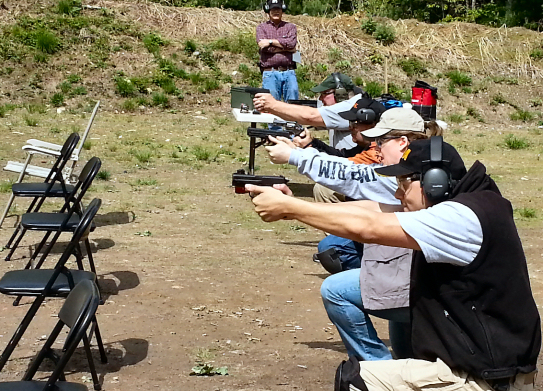 Must have been an Advanced Instructor for (2) years. In addition hold Handgun I-II Carbine I-II, Shotgun I-II, Precision Rifle and Range Master. Must have taught 30 classes, 20 of those classes must have been as Lead Instructor with a minimum of 100 students. Be submitted by a Master Instructor and passed all tests, interviews with a 95% or better. These Senior Instructors will instruct students using SAFTEA approved Handgun I-II Carbine I-II, Shotgun I-II, Precision Rifle and Master Range Officer syllabus, methods and maintain the standard set forth by the SAFTEA. They also assist MI in instructor classes.
Must have been an Advanced Instructor for (2) years. In addition hold Handgun I-II Carbine I-II, Shotgun I-II, Precision Rifle and Range Master. Must have taught 30 classes, 20 of those classes must have been as Lead Instructor with a minimum of 100 students. Be submitted by a Master Instructor and passed all tests, interviews with a 95% or better. These Senior Instructors will instruct students using SAFTEA approved Handgun I-II Carbine I-II, Shotgun I-II, Precision Rifle and Master Range Officer syllabus, methods and maintain the standard set forth by the SAFTEA. They also assist MI in instructor classes.
SAFTEA Master Instructors (MI)
Must have been a SAFTEA Senior Instructor, for (2) years be proficient in all fields of training (classroom, shooting and range operations), attended a Master Instructor conference and passed all tests, interviews with a 95% or better. Must have taught 36 classes, 20 of those classes must have been as Lead Instructor with a minimum of 100 students. Must be certified to teach all fields of training. These MI's will instruct students and instructor candidates using SAFTEA approved syllabus, methods and maintain the standard set forth by the SAFTEA. Sponsored by Regional or National
SAFTEA State Master Instructors (SMI)
Additional duties as MI and must be submitted by Regional MI and approved by National MI. Duties are to monitor and audit all instructors levels including Instructor, AI, SI, MI to check proficiency, ensure courses are being taught to SAFTEA syllabus, ethnics etc. The State MI will also handle correspondence from State 2A organizations and help in getting SAFTEA Course approved by their state of residence.
SAFTEA Regional Master Instructors (RMI)
Same as State MI, additionally must be approved by National MI and submitted by Regional MI. Regional MI's run and organize Master Instructor Conferences with approval and attendance by a National MI. Some State MI's are Founding National Training Board Members of SAFTEA. (They truly wrote the book). Without them this program would not have been possible.
Lead Instructor definition: Instructor in charge of the class, who runs, organizes and reports the class to the SAFTEA.
SAFTEA National Master Instructors
Head Quarters, National Executive Board
Revoking of Instructor, SI, AI, MI, RO, MRO status:
Any and all certifications may be revoked for, but not limited to:
- Unsafe acts in the classroom or range
- Ethics violations (Contract you signed)
- Not fulfilling commitments
- Improper behavior resulting in charges or reports to this organization
- Improper use SAFTEA logos, images, names or property
- Improper training
- Not following the syllabus, outline or class content
- Skipping sections
- Shortening or changing the course work or presentations
- Criminal convictions
- Actions which brings discredit the SAFTEA or its programs.
If your credentials are revoked by a State MI (It will be in writing on an official SAFTEA form, you may appeal to your regional MI for a review. Your last course of action is to contact the National MI's. Their decision is final. This process may be completed by email and phone conversations. All outcomes will be sent to the instructor via certified and regular mail.
Complaints will follow this chain of command.
If you see a SAFTEA instructor violating any of our rules that would jeopardize the safety of a student or the quality of any SAFTEA courses contact your State MI. You must complete the required paperwork and sign it.
Continuing Education & Training
Continuing Education & Training is mandatory for all training levels and will be a once a year, in person (classroom) or computer generated. This training is intended to keep all levels of trainers up to date on changes to classes and organizational policy.
Course Work Updates
SAFTEA course work will be updated frequently and at a minimum of once per year as new studies, techniques and changes/corrections are necessary.
Instructor Level Classes are available in the following disciplines:
- Methods of Instruction (MOI)
- Defensive Handgun 1 Instructor
- Defensive Handgun 2 Instructor
- Defensive Carbine 1 Instructor
- Defensive Carbine 2 Instructor
- Defensive Shotgun 1 Instructor
- Defensive Shotgun 2 Instructor
- Precision Rifle Instructor
- Range Master Development Course
- Range Officer
- SAFE - Instructor Development Course
For more info visit www.saftea.org or our page.
how to become a firearms instructor
Source: https://www.defensivestrategies.org/instructor-level-courses/become-an-instructor
Posted by: covarrubiaswheyed.blogspot.com

0 Response to "how to become a firearms instructor"
Post a Comment